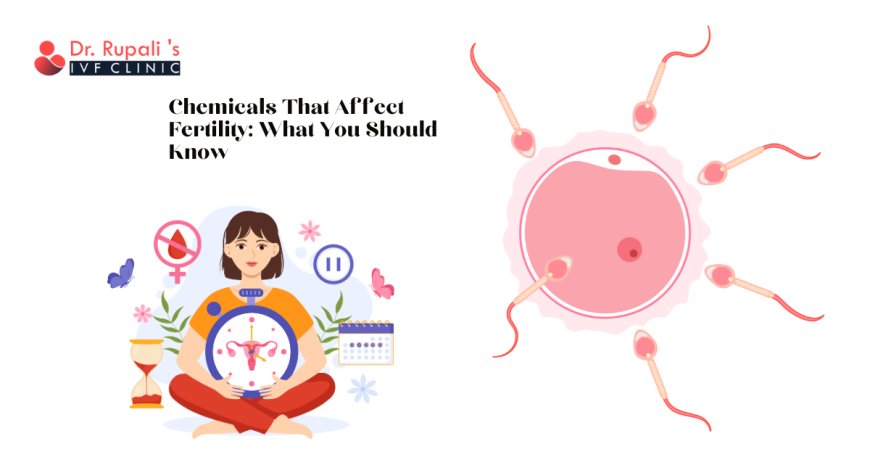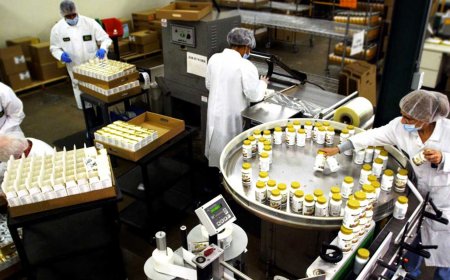Chemicals That Affect Fertility: What You Should Know
Learn how common chemicals impact fertility & how to protect yourself. Find advice from the best IVF doctor in Delhi NCR.

Introduction
Ever wonder why some people struggle to conceive even when they lead relatively healthy lifestyles? While age and genetics are often to blame, there's another major factor that's flying under the radarchemicals. Yes, everyday products like plastics, cleaning sprays, and even beauty creams might be affecting your ability to have a baby.
Sounds scary, right? But dont worrywe're diving deep into what these chemicals are, how they work, and most importantly, how you can protect yourself. Whether you're trying to conceive naturally or are seeking help from the best IVF doctor in Delhi NCR, this guide has something for you.
The term "fertility-disrupting chemicals" refers to substances that can interfere with the bodys natural reproductive processes. A large number of these compounds fall under the category of endocrine disruptors, meaning they alter hormone functionthe very signalling system that regulates fertility for both men and women.
The potential impact of these chemicals is worth paying attention to. Picture trying to assemble a jigsaw puzzle with pieces being removed as soon as you place them on the table. The reproductive system, delicate as it is, can feel that same sense of disruption when it is exposed to endocrine-altering substances. Because these compounds are prevalent in everyday productsfrom personal care items to kitchen utensilscompletely steering clear of them can be difficult.
Several specific chemicals have been highlighted by researchers for their ability to compromise reproductive health. Many of these received little fanfare when they were first introduced, and yet, they are entrenched in modern living.
One of the best-known offenders is the class of chemicals called phthalates. Manufacturers employ phthalates to add flexibility to many types of plastic, so they can be found in food wrap, vinyl flooring, shower curtains, personal-care products, and even some childrens toys. Studies associate them with lowered sperm counts in men as well as possible ovarian issues in women.
Another familiar name is bisphenol A, or BPA. This compound turns up in polycarbonate water bottles, food-storage containers, and the epoxy linings of many canned goods. Its structure allows it to masquerade as estrogen in the body, throwing off the fine hormonal equilibrium that both sexes rely on for healthy reproduction.
To help protect your reproductive health, look for labels that specifically advertise phthalate-free or BPA-free when you purchase personal-care or food-storage products. Small switches, repeated across many households, can add up to meaningful reductions in exposure.
Microwave containers and leftovers sit side by side on kitchen counters day after day. Yet reheating meals in certain plastic boxes can raise exposure to bisphenol A, or BPA. The heat draws out this chemical, which then leaches into food. If growing families are on your mind, you might pause before pressing the microwave button.
Farmers rely on pesticides and herbicides to combat insects, weeds, and corporate bottom lines. Despite rinsing apples or leaf lettuce, residues can linger like unwanted house guests. Research connects these chemicals to declines in both male and female fertility. That bowl of greens marketed as wholesome may, in quiet fashion, be hedging your odds.
Heavy metals tell a different, but equally cautionary, tale. Lead drips from decaying pipes; mercury crowds the flesh of some ocean giants. Chronic contact with these elements is linked to sperm shape irregularities, late ovulation, and even miscarriage. One straightforward guardrail: limit servings of swordfish and large tuna steaks. Your dinner plate is no place for half-measures.
Flame retardants win praise from insurance brokers but cause headaches for reproductive specialists. Upholstered sofas and high-tech gadgets swallow these additives, which slowly leach out. Over years they gather in the body, nudging hormones off course and dimming egg quality.
Last, we have PFASpolite initials for chemicals that refuse to leave. They cling to frying pans, keep raincoats dry, and line fast-food paperware. Scientists label them forever chemicals for good reason. They disrupt hormone pathways and repeatedly crop up in studies linking lower fertility to daily exposures. It may be time to rethink that hot burger in a grease-proof wrapper.
Chemicals Affecting Male Fertility
Men are far from exempt when it comes to reproductive toxins. Research shows that various industrial chemicals, pesticides, and persistent pollutants can lower sperm count, hinder motility, and even compromise the genetic material inside the sperm head. In fact, data collected over the last half century indicates that the global average sperm concentration has declined by more than halfan alarming trend often linked to growing chemical exposure.
Chemicals Affecting Female Fertility
Women face their own set of challenges from these ubiquitous substances. Endocrine disruptors and environmental toxins have been shown to interfere with hormone signaling, throwing ovulatory rhythms off course and potentially damaging eggs before they are released. Long-term contact has also been tied to more chronic conditions, including polycystic ovary syndrome and endometriosis, both of which can complicate conception and pregnancy.
Everyday Sources of Exposure
Most people do not realize how routinely they encounter these fertility-damaging compounds:
Plastic containers and single-use water bottles that leach BPA and phthalates
Common household cleaning solutions that carry harsh synthetic fragrances
Skin lotions, shampoos, and perfumes loaded with parabens and other preservatives
Produce treated with chemical fertilizers and pesticides, when conventionally farmed
Frying pans and storage wraps coated with PTFE or similar non-stick polymers
Tips to Reduce Your Chemical Exposure
Fortunately, safeguarding your reproductive health need not involve a radical lifestyle change. A handful of straightforward adjustments can significantly cut exposure:
Swap plastic for glass or stainless steel, especially in the kitchen
Choose organic fruits and vegetables whenever practical, particularly for thin-skinned varieties
Make your own all-purpose cleaners using vinegar, baking soda, and essential oils or buy brands that list all ingredients
Reheat meals on ceramic or glass plates rather than in plastic containers
Read labels on cosmetics and hygiene products, opting for those marked fragrance-free or paraben-free
Lastly, think of your living space as a miniature ecosystem: every product you allow inside affects the environment you are unknowingly nurturing.
Role of a Fertility Specialist
When concerns arise about how everyday chemicals might be influencing fertility, a specialist in reproductive health can provide clarity. These experts typically start with detailed hormone assessments, suggest attainable lifestyle modifications, and, if necessary, recommend advanced options such as in vitro fertilisation (IVF).
When to See the Best IVF Doctor in Delhi NCR
Couples who have been trying to conceive for twelve monthssix months for those aged thirty-five or oldershould think about professional advice. In Delhi NCR, a leading IVF practitioner will assess both medical histories and potential environmental risks, including chemical exposures, that could be hindering conception.
Expert Insight
Most reputable fertility clinics now pair traditional therapies with holistic support, including tailored detox protocols, nutritional counselling, and flexible treatment schedules designed round the patients needs.
Conclusion
Awareness of the substances we encounter every day is empowering rather than paralysing. Knowledge enables small, strategic adjustments that could enhance the odds of pregnancy. Should uncertainty linger, turning to an experienced IVF consultant in Delhi NCR may be one of the most constructive steps you take on this journey.
FAQs
1. What exactly are endocrine-disrupting chemicals and what impact do they have on reproductive health? Endocrine-disrupting chemicals (EDCs) interfere with the bodys hormonal signalling, which can lead to a drop in sperm production, irregular ovulation, or an earlier onset of menopause-like symptoms.
2. Is there a risk to fertility from products we encounter every day at home? Certainly. Everyday cleaners, plastic containers, and even some cosmetics carry compounds that have been linked to diminished reproductive ability in both women and men.
3. What practical steps can I take to minimise my exposure to these reproductive hazards? Consider using glass or stainless steel for food storage, opting for organic produce when possible, steering clear of synthetic fragrances, and selecting biodegradable or plant-based cleaning agents.
4. Are men just as vulnerable to these substances as women are? Yes, men are at risk too; chemical exposure can result in lower sperm counts, poorer motility, and negative shifts in testosterone and other hormone levels.
5. At what point should I reach out to a fertility expert or IVF clinic? If you are under 35 and have been trying to conceive for a year without success, or if you are over 35 and have been trying for six months, it is advisable to schedule a consultation with a specialist.





































